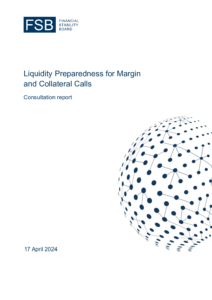Press enquiries:
+41 61 280 8477
[email protected]
Ref: 8/2024
-
FSB report identifies weaknesses in risk management and governance as key causes of inadequate liquidity preparedness by some non-bank market participants during recent incidents of liquidity stress in financial markets.
-
Report proposes eight policy recommendations focused on managing and mitigating the impact of spikes in margin and collateral calls in the non-bank financial intermediation (NBFI) sector.
-
Proposed recommendations cover liquidity risk management and governance, stress testing and scenario design, and collateral management practices of non-bank financial institutions.
The Financial Stability Board (FSB) published today a consultation report on liquidity preparedness for margin and collateral calls. The report sets out eight proposed policy recommendations to enhance the liquidity preparedness of non-bank market participants for margin and collateral calls in centrally and non-centrally cleared derivatives and securities markets (including securities financing such as repo).
The report highlights the need for policy adjustments to deal with liquidity strains in the NBFI sector arising from spikes in margin and collateral calls during times of market stress, such as the March 2020 market turmoil, Archegos, and the commodities markets turmoil and stress in liability-driven investment funds in 2022. To achieve this, the FSB is proposing eight high-level and cross-sectoral policy recommendations that build on and complement existing rules and regulations on liquidity risk management across different sectors and jurisdictions.
The recommendations cover liquidity risk management and governance, stress testing and scenario design, and collateral management practices of non-bank market participants, focussing on liquidity risks arising from spikes in margin and collateral calls. They apply to non-bank market participants that may face margin and collateral calls, including insurance companies, pension funds, hedge funds, other investment funds and family offices. They are proposed to apply proportionately with a focus on non-bank market participants with material exposures to spikes in margin and collateral calls during times of stress. The report also highlights the need for financial intermediaries in bilateral transactions with non-financial entities, such as commodities traders, to consider assessing their liquidity preparedness for spikes in margin calls and collateral during times of stress.
The FSB is inviting comments on this consultation report and the questions set out there. Responses should be submitted via this secure online form by 18 June 2024. For questions, please contact the FSB ([email protected]). Responses will be published on the FSB’s website unless respondents expressly request otherwise on the online form.
Notes to editors
This work forms part of the FSB’s work programme on enhancing the resilience of NBFI. It follows up on the findings of a review of margining practices conducted in 2022 by the (BCBS) Bank for International Settlements’ Committee on Payments and Market Infrastructures (CPMI) and the International Organization of Securities Commissions (IOSCO). The review recommended that the FSB undertake additional international work on enhancing liquidity preparedness of market participants and on regulatory data gaps, so that authorities can better monitor the NBFI sector’s liquidity preparedness.
Further details on the FSB’s work programme to enhance resilience in NBFI can be found in its latest progress report.
The FSB coordinates at the international level the work of national financial authorities and international standard-setting bodies and develops and promotes the implementation of effective regulatory, supervisory, and other financial sector policies in the interest of financial stability. It brings together national authorities responsible for financial stability in 24 countries and jurisdictions, international financial institutions, sector-specific international groupings of regulators and supervisors, and committees of central bank experts. The FSB also conducts outreach with approximately 70 other jurisdictions through its six Regional Consultative Groups.
The FSB is chaired by Klaas Knot, President of De Nederlandsche Bank. The FSB Secretariat is located in Basel, Switzerland and hosted by the Bank for International Settlements.
